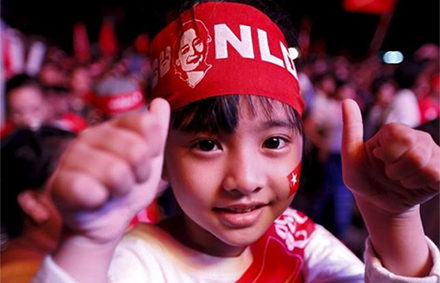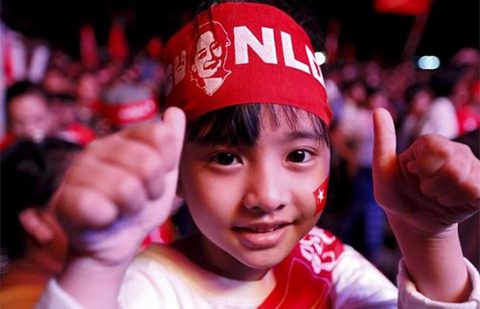
Managing Myanmar’s transition challenges requires humility and an eye for history.
The NLD’s decisive victory in Myanmar’s election is being labeled a victory for democracy. On many levels this is correct.
Myanmar citizens emphatically embraced the freedom to vote in a free election after decades of exclusion. The sense of joy and empowerment the experience and collective message of change provided cannot be adequately captured in words. Across Myanmar, there is still a sense of post-election euphoria.
It is also widely understood that the struggle for democracy and the country’s political transition is far from over. In fact, the post-election environment arguably will be more difficult than the tasks of managing and winning an election.
Most attention has focused on the military and whether it will accept the results. There is worry over a repeat of history in 1990, when similar NLD landslide-like results were dismissed. On many levels conditions are radically different than they were 25 years ago.
The military has vested economic interests in a more globally integrated Myanmar and opportunities for institutional capacity-building that can enhance the professionalism of the organisation. Many in the Tatmadaw (although not all) understand that repeating history will cause more damage to the military’s position and standing than it did in the past, and erode the legitimation process that the military itself initiated. It is important to acknowledge that these elections were part of the military’s ‘road map to democracy’ started in 2003. The reality is that the military has little to gain from turning back.
On other levels, conditions hauntingly echo the past.
Suspicions persist. The presence of hardliners within the system ready to derail further opening and inclusion add to these doubts. Distrust especially permeates the relationship between the military and the National League for Democracy, including with its leader Daw Aung San Suu Kyi. Actions around the election, including the pre-campaign purge of Thura Shwe Mann and responses to criticisms during the campaign itself, as well as talk of pedestal-like political positioning to date have featured poles rather than bridges.
What will foster a positive outcome for acceptance of the results is an appreciation of the lessons from history. Humility will have to overshadow hubris. Compromise will have to be an essential element in any viable solution, as this has been the pattern in other top-down transitions from Brazil to South Africa. The military’s congratulations of the NLD this week send positive signals.
The role of the military connects closely to the second major challenge, addressing ethnic conflict and religious strife. It is not a coincidence that violent clashes occurred immediately after Sunday’s polls. The 2015 election involved a larger disenfranchised area than in 2010. Conflict has long been intertwined with the Tatmadaw’s political role. The military justifies its prominence due to conflict. At the same time, it is party and catalyst to long-standing divisions.
At times, the military is also the only institution that can control tensions, as illustrated in military management post-2012 in Rakhine. The path the Tatmadaw takes in the months ahead, regarding different ethnic armed groups and its approach to accepting a larger NLD role will shape the trajectory for potential bloodshed. The arduous negotiations over ceasefires and the mixed gains associated with the peace process shows it will be more difficult to move the military away from the path of conflict.
The Tatmadaw is not the only stakeholder in the conflicts. Armed groups have vested interest in controlling territory and autonomy, tied to lucrative resources and legitimation of their political roles. What has not yet been fully appreciated is how much the ethnic political landscape has shifted in Sunday’s election.
While the results are not finalised, ethnic parties have performed below expectations, with the exception of the Arakan National Party in Rakhine and the Shan National League for Democracy.
Myanmar primarily voted for the national future rather than their specific nation. While it is not as clear-cut at this, as they often voted for representatives from their ethnic communities under the NLD banner, there will be challenges in assuring ethnic representation within the Bamar-majority party, especially given the reality that the NLD lacks experience in managing interests either in a party organisation or importantly in government. Everyone is asking the executive question of who will be president, but from the perspective of ethnic communities and representatives the key answers involve how states and regions will be governed, and how ethnic interests will be served.
The role that political parties will play and the challenges they face ahead should not be underestimated. The lens of the media has centered on Daw Aung San Suu Kyi, whose persona and leadership was the main factor in contributing to the NLD victory, along with long-standing resentment toward military rule.
The NLD candidate profile was uneven, dominated with those who are fighters and loyalists rather than technocrats or problem-solvers. The distrustful opposition mindset of the NLD runs deep, with obstacles ahead in transforming their role into one of government. The party is hierarchical and tied to a charismatic leader and is relying on this dynamic to push ahead, with the model of Nelson Mandela’s African National Congress illustrative.
The key will be the NLD’s viability as an institution, and cohesiveness – managing large numbers of members now in office and some disgruntled members denied this opportunity will be a major challenge.
Staving off deepening patronage politics – corruption and cronyism – will be particularly demanding, as to reducing internal factionalism and personal divisions. This will be complicated by the fact that Daw Aung San Suu Kyi’s direct involvement in party affairs will be minimised by other leadership priorities, and as yet an ambiguous and untested second-level NLD leadership. Questions surround the ability of the NLD to work together, cooperate with others, and to govern.
As the NLD’s role is changing, so will that of the Union Solidarity and Development Party.
Results so far show that the USDP’s worst-case scenario has materialised, with the former ruling party securing a low number of seats. The final count is not yet in, but it should be acknowledged that the first-past-the-post system accentuates the results toward the victor, the NLD. The detailed numbers also show that the USDP has supporters, and they cannot be dismissed in any inclusive national reconciliation process.
The USDP was in the unenviable position of being caught between the military that represented the past and an alternative party that captured the hopes of the future. They could not get out of the shadow darkening their present, and their conflicting strategies of mobilising religious intolerance and trying to capitalise on goodwill from reform did not gain traction.
The former backfired and the latter fell flat, with Myanmar just not satisfied with the changes that have occurred, especially in the economy and in improving livelihoods. Attempts to rely on advance votes for seats also were inadequate to offset close races due to high swell of NLD support, whose campaign was more successful in winning over undecided voters. The USDP now has to make way, with concessions in defeat sending good signals and precedents in this regard.
On many levels the USDP has shown strong national leadership, with still President U Thein Sein’s and Speaker of the House Thura Shwe Mann’s legacy roles being defined now more than ever. Stepping aside is not easy and faces resistance. It is more complicated that is sounds, as the USDP has to take on new roles and continue to lead. The USDP’s role as a bridge remains vital.
The Myanmar people, who spoke out emphatically for change, have perhaps the greatest challenge of all.
They are waiting for their leaders and the institutions they control to do the right thing, to listen to the call-for-change message they have clearly sent, and to deliver on the hopes and dreams they want fulfilled. History has shown that the Myanmar people are patient, but today’s context is one where rumor and social media play a role and expectations have risen.
Myanmar’s leaders will choose how they balance meaningful public engagement, transparency and statesmanlike statements with constructive backroom negotiations. Time will tell whether the public arena will become a place for posturing or trust-building.
Myanmar’s post-election environment of uncertainty will be shaped by the lessons learned from its past, but it will also take on new forms and trajectories as history is being reshaped with potential new paths to be taken ahead.
Bridget Welsh is Professor of Political Science at Ipek University, Senior Research Associate at the Center for East Asian Democratic Studies of National Taiwan University, Senior Associate Fellow of The Habibie Center, and University Fellow of Charles Darwin University.
This article forms part of New Mandala’s ‘Myanmar and the vote‘ series.
 Facebook
Facebook  Twitter
Twitter  Soundcloud
Soundcloud  Youtube
Youtube  Rss
Rss 